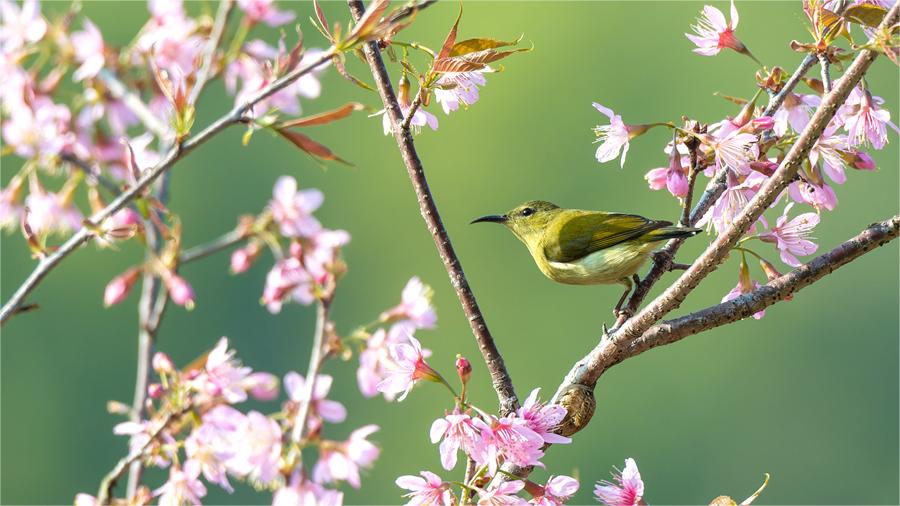Foreign specialty crops thrive in SW China's Yunnan
Coffee, Australian macadamia nuts, and avocados, regarded as foreign specialty crops, have found a thriving environment in southwest China's Yunnan Province, bringing prosperity to local communities.
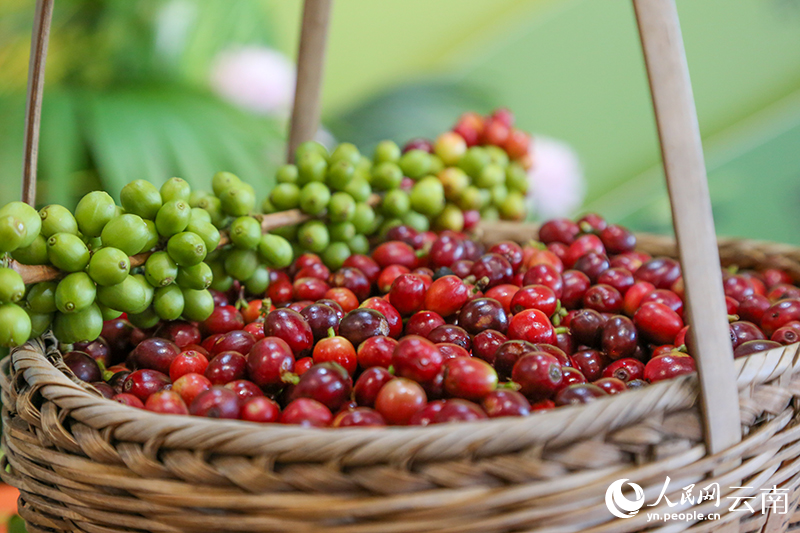
Photo shows coffee beans at a plantation in southwest China's Yunnan Province. (People's Daily Online/Hu Zunhui)
Hua Runmei, a 31-year-old resident, has been cultivating coffee in Pu'er city, Yunnan, for nine years. She also manages a coffee farm. In the first 10 months of 2023, 257,000 individuals were engaged in the coffee industry in Pu'er city, helping to generate a comprehensive tourism revenue of 1.7 billion yuan ($236 million).
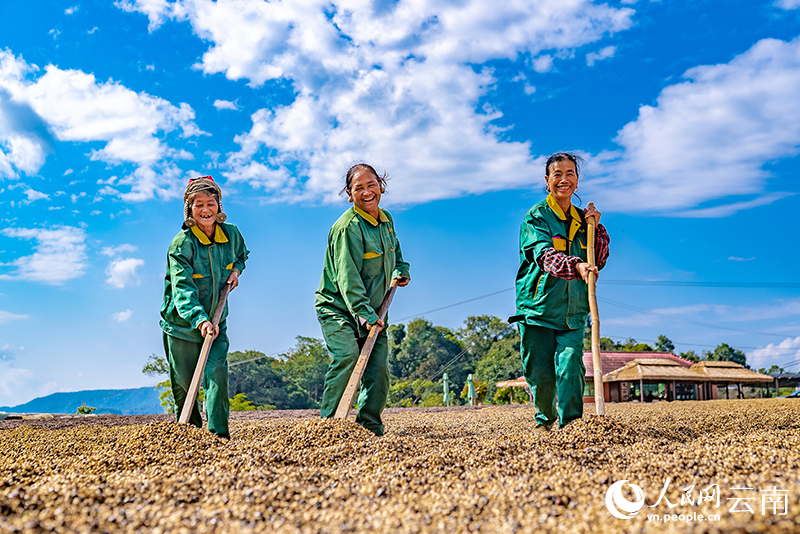
Farmers dry coffee beans under the sun in Fuyan township, Menglian county, southwest China's Yunnan Province, Jan. 16, 2024. (People's Daily Online/Hu Zunhui)
The history of coffee in Yunnan dates back to 1892, when a French missionary planted the first coffee tree. Although this foreign seed managed to take root and sprout, it did not develop on a large scale initially. It was not until the 1980s, as China began to integrate more into the international community, that coffee cultivation began to flourish in Yunnan.
In 1988, Hua's grandfather led the villagers of Dakaihe village to start planting coffee. However, due to a focus on primary production and the practice of mainly selling low-priced raw materials, the added value of Yunnan coffee remained low.
From 2009 onwards, Hua's father established a coffee cooperative and a trading company. A cooperative framework was formed among the company, the farmers, and the cooperative to drive the development of the coffee industry. Despite these efforts, Yunnan coffee continued to face discrimination in the market, leaving the coffee farmers with limited bargaining power.
In 2015, Hua joined the coffee farm, collaborating with other coffee farmers to improve the coffee-growing environment. They insisted on manual weeding and organic fertilization and strived to build high-quality coffee fields.
After years of work, approximately 1,000 mu (67 hectares) of land received EU organic certification in 2018. This land is now capable of producing an annual total of 100 tonnes of high-quality coffee beans.
Data from the 2022-2023 harvest season indicated that the purchase price of Yunnan coffee beans increased by about $1.5 per kilogram, according to the New York futures price.
This price increase can be attributed to the rapid emergence of China as the world's fastest-growing coffee consumption market, boasting an average annual growth rate of over 15 percent.
This booming market has thrust Pu'er into the spotlight. As of 2022, Yunnan accounted for more than 98 percent of China's coffee planting area, with a total of 1.27 million mu dedicated to coffee cultivation.
In Pu'er, the coffee planting area has expanded to 679,000 mu, and the production of coffee beans in the 2022-2023 harvest season amounted to 51,300 tonnes, achieving a comprehensive output value of 6.3 billion yuan.
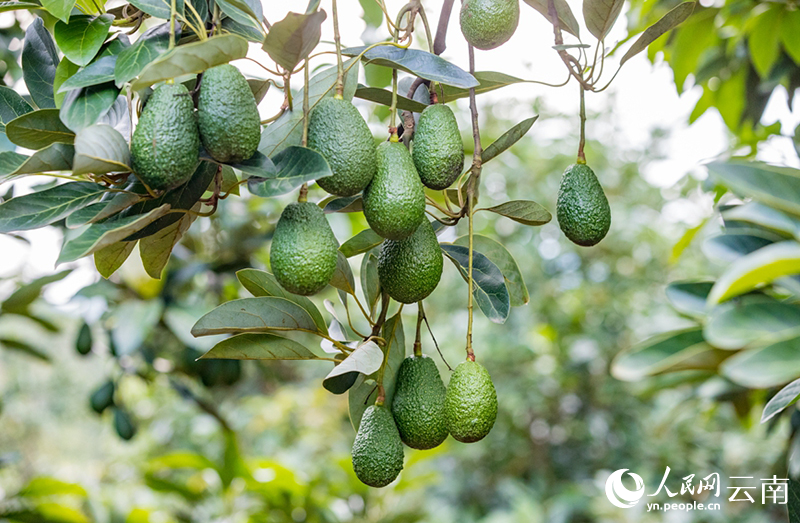
Photo shows avocados on tree branches in southwest China's Yunnan Province. (People's Daily Online/Hu Zunhui)
In addition to coffee, Pu'er is also known for its avocado production.
The trial cultivation of avocados in Menglian county, which began in 2007, proved to be successful.
Currently, the avocado planting area there has expanded to 108,300 mu, not only filling the domestic production gap but also replacing 15 percent of the imported share.
Nuodong village in Gongxin township, Menglian county, was one of the early adopters of avocado cultivation. The county currently has 3,026 mu of land devoted to avocado planting, with 1,200 mu in full production.
In 2018, Nuodong village established an avocado-planting farmers' cooperative. This cooperative allows farmers to contribute their land as shares, ensuring shared benefits for all involved.
Over the years, the avocado industry has experienced steady growth, benefiting both the industry and the local community.
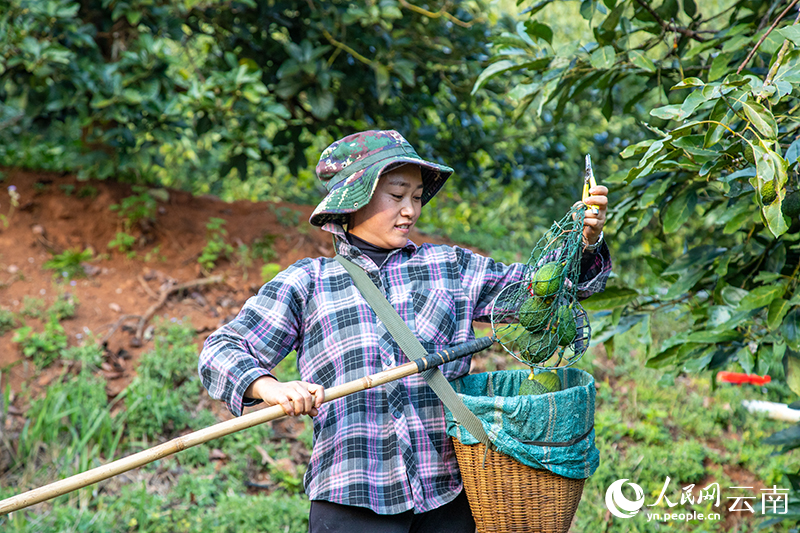
A villager picks avocados. (People's Daily Online/Hu Zunhui)
In 2023, with support from Shanghai, Nuodong village constructed drip irrigation facilities and an industrial ecological park for avocado cultivation. The village also built a 700-meter-long avocado industry scenic trail, a tasting center, a picnic campsite, and an ecological vegetable garden. This project has benefited 10 village groups in Nuodong.
During the 2023-2024 harvest season, the avocado planting area in Menglian county reached 20,400 mu, with an estimated fresh fruit yield of 17,300 tonnes, achieving an output value of over 600 million yuan.
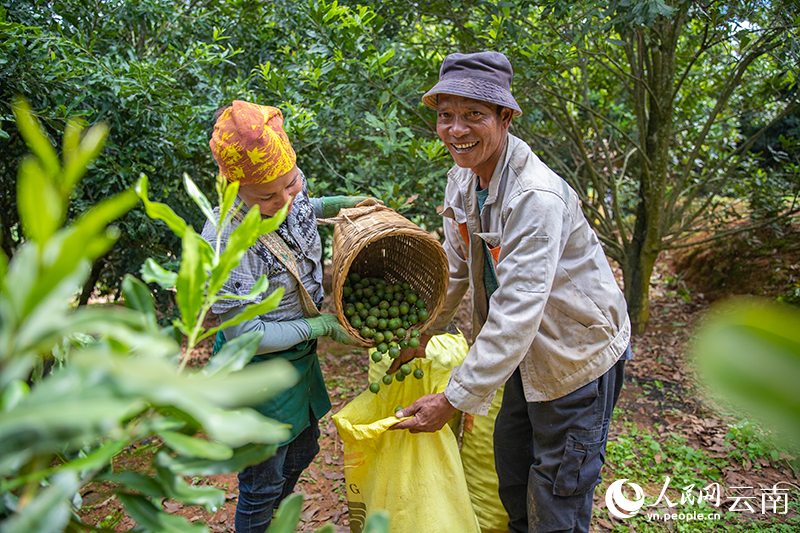
Villagers pick Australian macadamia nuts. (People's Daily Online/Hu Zunhui)
In the 1990s, Yunnan introduced Australian macadamia nuts, marking the beginning of their cultivation in the region. By 2023, the planting area for Australian macadamia nuts in Yunnan had reached 4.2 million mu. This achievement positioned Yunnan as the world's largest planting region for Australian macadamia nuts.
In 1991, Yongde county in Lincang city began experimenting with the cultivation of Australian macadamia nuts.
In 2002, Lincang identified Australian macadamia nuts as a key species for reforestation. The city welcomed eight leading nut companies and initiated efforts to forge international partnerships, promote domestic research, and establish quality control platforms. These measures were aimed at facilitating the widespread expansion of nut cultivation.
Over the years, with government support, the driving force of leading companies, and active participation from farmers, the Australian macadamia nut industry in Lincang has experienced rapid growth. This development has helped many farmers increase their income and has become an integral part of Yunnan's agriculture.
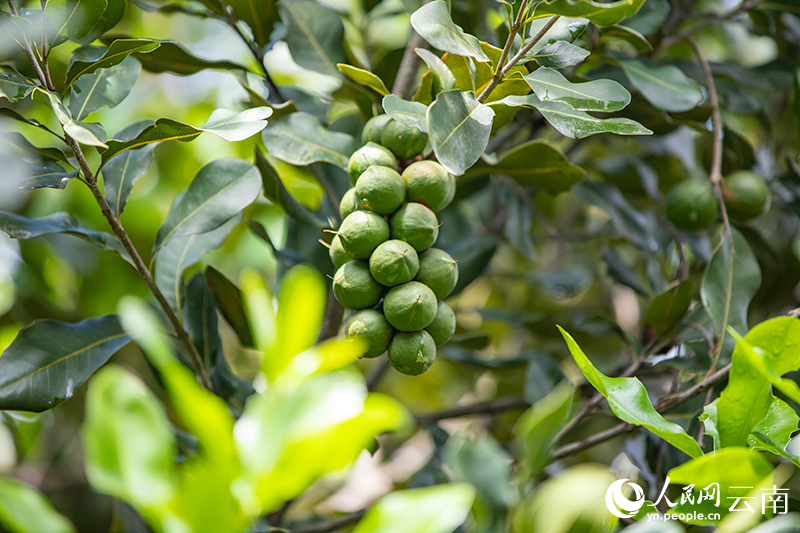
Tree branches are laden with Australian macadamia nuts. (People's Daily Online/Hu Zunhui)
The macadamia planting area in Lincang has reached 2.63 million mu, accounting for 40 percent of the global planting area.
In recent years, a variety of new nut products have been developed, including nut paste, nut oil, nut honey, nut pastry, and other products, thereby extending and deepening the nut industrial chain.
By 2023, Lincang produced 96,500 tonnes of macadamia nuts, with a comprehensive output value of 5.94 billion yuan.
Photos
Related Stories
- Coffee beans bring prosperity to south China village
- Coffee craze in China's "city of the future" brews up entrepreneurial spirit
- Chinese market boosting growth in Brazilian coffee exports
- China sets up microbial strain resource dataset for coffee fermentation
- Coffee-themed tours brewing interest in southwest China
- China's Yunnan brews pour-over coffee using novel technologies
Copyright © 2024 People's Daily Online. All Rights Reserved.








